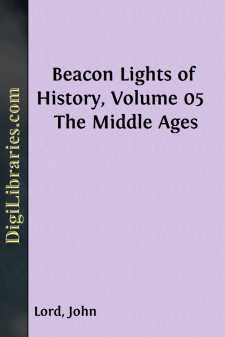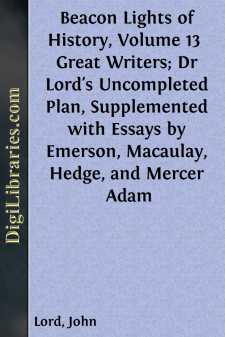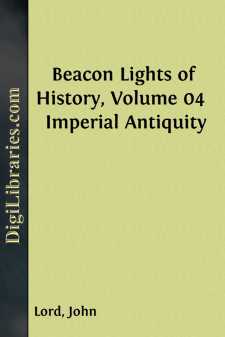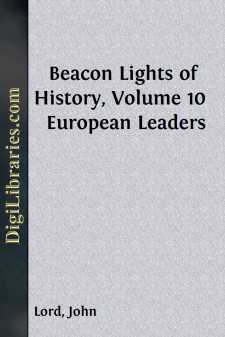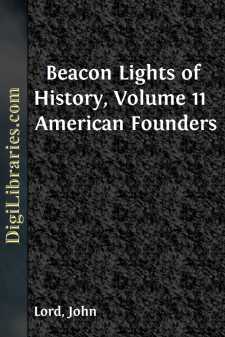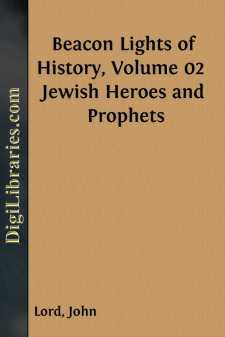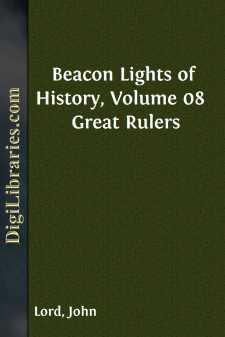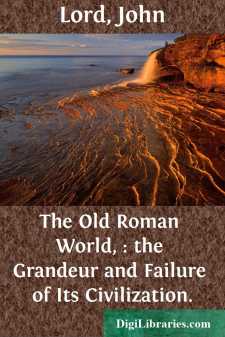Categories
- Antiques & Collectibles 13
- Architecture 36
- Art 48
- Bibles 22
- Biography & Autobiography 813
- Body, Mind & Spirit 142
- Business & Economics 28
- Children's Books 14
- Children's Fiction 11
- Computers 4
- Cooking 94
- Crafts & Hobbies 4
- Drama 346
- Education 46
- Family & Relationships 57
- Fiction 11829
- Games 19
- Gardening 17
- Health & Fitness 34
- History 1377
- House & Home 1
- Humor 147
- Juvenile Fiction 1873
- Juvenile Nonfiction 202
- Language Arts & Disciplines 88
- Law 16
- Literary Collections 686
- Literary Criticism 179
- Mathematics 13
- Medical 41
- Music 40
- Nature 179
- Non-Classifiable 1768
- Performing Arts 7
- Periodicals 1453
- Philosophy 64
- Photography 2
- Poetry 896
- Political Science 203
- Psychology 42
- Reference 154
- Religion 513
- Science 126
- Self-Help 84
- Social Science 81
- Sports & Recreation 34
- Study Aids 3
- Technology & Engineering 59
- Transportation 23
- Travel 463
- True Crime 29
Beacon Lights of History, Volume 05 The Middle Ages
by: John Lord
Description:
Excerpt
SAINT ANSELM.
A. D. 1033-1109.
MEDIAEVAL THEOLOGY.
The Middle Ages produced no more interesting man than Anselm, Abbot of Bec and Archbishop of Canterbury,--not merely a great prelate, but a great theologian, resplendent in the virtues of monastic life and in devotion to the interests of the Church. He was one of the first to create an intellectual movement in Europe, and to stimulate theological inquiries.
Anselm was born at Aosta, in Italy, 1033, and he died in 1109, at the age of 76. He was therefore the contemporary of Hildebrand, of Lanfranc, of Bérenger, of Roscelin, of Henry IV. of Germany, of William the Conqueror, of the Countess Matilda, and of Urban II. He saw the first Crusade, the great quarrel about investitures and the establishment of the Normans in England. Aosta was on the confines of Lombardy and Burgundy, in a mountainous district, amid rich cornfields and fruitful vines and dark, waving chestnuts, in sight of lofty peaks with their everlasting snow. Anselm belonged to a noble but impoverished family; his father was violent and unthrifty, but his mother was religious and prudent. He was by nature a student, and early was destined to monastic life,--the only life favorable to the development of the intellect in a rude and turbulent age. I have already alluded to the general ignorance of the clergy in those times. There were no schools of any note at this period, and no convents where learning was cultivated beyond the rudiments of grammar and arithmetic and the writings of the Fathers. The monks could read and talk in Latin, of a barbarous sort,--which was the common language of the learned, so far as any in that age could be called learned.
The most famous place in Europe, at that time, where learning was cultivated, was the newly-founded abbey of Bec in Normandy, under the superintendence of the Archbishop of Rouen, of which Lanfranc of Pavia was the prior. It was the first abbey in Normandy to open the door of learning to the young and inquiring minds of Western Europe. It was a Benedictine abbey, as severe in its rules as that of Clairvaux. It would seem that the fame of this convent, and of Lanfranc its presiding genius (afterwards the great Archbishop of Canterbury), reached the ears of Anselm; so that on the death of his parents he wandered over the Alps, through Burgundy, to this famous school, where the best teaching of the day was to be had. Lanfranc cordially welcomed his fellow-countryman, then at the age of twenty-six, to his retreat; and on his removal three years afterwards to the more princely abbey of St. Stephen in Caen, Anselm succeeded him as prior. Fifteen years later he became abbot, and ruled the abbey for fifteen years, during which time Lanfranc--the mutual friend of William the Conqueror and the great Hildebrand--became Archbishop of Canterbury.
During this seclusion of thirty years in the abbey of Bec, Anselm gave himself up to theological and philosophical studies, and became known both as a profound and original thinker and a powerful supporter of ecclesiastical authority. The scholastic age,--that is, the age of dialectics, when theology invoked the aid of philosophy to establish the truths of Christianity,--had not yet begun; but Anselm may be regarded as a pioneer, the precursor of Thomas Aquinas, since he was led into important theological controversies to establish the creed of Saint Augustine. It was not till several centuries after his death, however, that his remarkable originality of genius was fully appreciated. He anticipated Descartes in his argument to prove the existence of God. He is generally regarded as the profoundest intellect among the early schoolmen, and the most original that appeared in the Church after Saint Augustine. He was not a popular preacher like Saint Bernard, but he taught theology with marvellous lucidity to the monks who sought the genial quiet of his convent. As an abbot he was cheerful and humane, almost to light-heartedness, frank and kind to everybody,--an exception to most of the abbots of his day, who were either austere and rigid, or convivial and worldly. He was a man whom everybody loved and trusted, yet one not unmindful of his duties as the supreme ruler of his abbey, enforcing discipline, while favoring relaxation. No monk ever led a life of higher meditation than he; absorbed not in a dreamy and visionary piety, but in intelligent inquiries as to the grounds of religious belief. He was a true scholar of the Platonic and Augustinian school; not a dialectician like Albertus Magnus and Abélard, but a man who went beyond words to things, and seized on realities rather than forms; not given to disputations and the sports of logical tournaments, but to solid inquiries after truth. The universities had not then arisen, but a hundred years later he would have been their ornament, like Thomas Aquinas and Bonaventura.
Like other Norman abbeys, the abbey of Bec had after the Conquest received lands in England, and it became one of the duties of the abbot to look after its temporal interests. Hence Anselm was obliged to make frequent visits to England, where his friendship with Lanfranc was renewed, and where he made the acquaintance of distinguished prelates and abbots and churchmen, among others of Eadmer, his future biographer. It seems that he also won the hearts of the English nobility by his gentleness and affability, so that they rendered to him uncommon attentions, not only as a great ecclesiastic who had no equal in learning, but as a man whom they could not help loving.
The life of Anselm very nearly corresponded with that of the Conqueror, who died in 1087, being five years older; and he was Abbot of Bec during the whole reign of William as King of England. There was nothing particularly memorable in his life as abbot aside from his theological studies. It was not until he was elevated to the See of Canterbury, on the death of Lanfranc, that his memorable career became historical. He anticipated Thomas Becket in his contest to secure the liberties of the Church against the encroachments of the Norman kings. The cause of the one was the cause of the other; only, Anselm was trained in monastic seclusion, and Becket amid the tumults and intrigues of a court. The one was essentially an ecclesiastic and theologian; the other a courtier and statesman. The former was religious, and the latter secular in his habits and duties. Yet both fought the same great battle, the essential principle of which was the object of contention between the popes and the emperors of Germany,--that pertaining to the right of investiture, which may be regarded, next to the Crusades, as the great outward event of the twelfth century. That memorable struggle for supremacy was not brought to a close until Innocent III made the kings of the earth his vassals, and reigned without a rival in Christendom. Gregory VII had fought heroically, but he died in exile, leaving to future popes the fruit of his transcendent labors.
Lanfranc died in 1089,--the ablest churchman of the century next to the great Hildebrand, his master. It was through his influence that England was more closely allied with Rome, and that those fetters were imposed by the popes which the ablest of the Norman kings were unable to break. The Pope had sanctioned the atrocious conquest of England by the Normans--beneficially as it afterwards turned out--only on the condition that extraordinary powers should be conferred on the Archbishop of Canterbury, his representative in enforcing the papal claims, who thus became virtually independent of the king,--a spiritual monarch of such dignity that he was almost equal to his sovereign in authority. There was no such See in Germany and France as that of Canterbury. Its mighty and lordly metropolitan had the exclusive right of crowning the king. To him the Archbishop of York, once his equal, had succumbed. He was not merely primate, but had the supreme control of the Church in England. He could depose prelates and excommunicate the greatest personages; he enjoyed enormous revenues; he was vicegerent of the Pope.
Loth was William to concede such great powers to the Pope, but he could not be King of England without making a king of Canterbury. So he made choice of Lanfranc--then Abbot of St. Stephen, the most princely of the Norman convents--for the highest ecclesiastical dignity in his realm, and perhaps in Europe after the papacy itself. Lanfranc was his friend, and also the friend of Hildebrand; and no collision took place between them, for neither could do without the other. William was willing to waive some of his prerogatives as a sovereign for such a kingdom as England, which made him the most powerful monarch in Western Europe, since he ruled the fairest part of France and the whole British realm, the united possession of both Saxons and Danes, with more absolute authority than any feudal sovereign at that time possessed. His victorious knights were virtually a standing army, bound to him with more than feudal loyalty, since he divided among them the lands of the conquered Saxons, and gave to their relatives the richest benefices of the Church. With the aid of an Italian prelate, bound in allegiance to the Pope, he hoped to cement his conquest. Lanfranc did as he wished,--removed the Saxon bishops, and gave their sees to Normans. Since Dunstan, no great Saxon bishop had arisen. The Saxon bishops were feeble and indolent, and were not capable of making an effective resistance. But Lanfranc was even more able than Dunstan,--a great statesman as well as prelate. He ruled England as grand justiciary in the absence of the monarch, and was thus viceregent of the kingdom. But while he despoiled the Saxon prelates, he would suffer no royal spoliation of the Norman bishops. He even wrested away from Odo, half-brother of the Conqueror, the manors he held as Count of Kent, which originally belonged to the See of Canterbury. Thus was William, with all his greed and ambition, kept in check by the spiritual monarch he had himself made so powerful.
On the death of this great prelate, all eyes were turned to Anselm as his successor, who was then Abbot of Bec, absorbed in his studies. But William Rufus, who had in the mean time succeeded to the throne of the Conqueror, did not at once appoint any one to the vacant See, since he had seized and used its revenues to the scandal of the nation and the indignation of the Church. For five years there was no primate in England and no Archbishop of Canterbury. At last, what seemed to be a mortal sickness seized the King, and in the near prospect of death he summoned Anselm to his chamber and conferred upon him the exalted dignity,--which Anselm refused to accept, dreading the burdens of the office, and preferring the quiet life of a scholar in his Norman abbey. Like Thomas Aquinas, in the next century, who refused the archbishopric of Naples to pursue his philosophical studies in Paris, Anselm declined the primacy of the Church in England, with its cares and labors and responsibilities, that he might be unmolested in his theological inquiries. He understood the position in which he should be placed, and foresaw that he should be brought in collision with his sovereign if he would faithfully guard the liberties and interests of the Church. He was a man of peace and meditation, and hated conflict, turmoil, and active life. He knew that one of the requirements of a great prelate is to have business talents, more necessary perhaps than eloquence or learning. At last, however, on the pressing solicitation of the Pope, the King, and the clergy, he consented to mount the throne of Lanfranc, on condition that the temporalities, privileges, and powers of the See of Canterbury should not be attacked. The crafty and rapacious, but now penitent monarch, thinking he was about to die, and wishing to make his peace with Heaven, made all the concessions required; and the quiet monk and doctor, whom everybody loved and revered, was enthroned and consecrated as the spiritual monarch of England.
Anselm's memorable career as bishop began in peace, but was soon clouded by a desperate quarrel with his sovereign, as he had anticipated. This learned and peace-loving theologian was forced into a contest which stands out in history like the warfare between Hildebrand and Henry IV. It was the beginning of that fierce contest in England which was made memorable by the martyrdom of Becket. Anselm, when consecrated, was sixty years of age,--a period of life when men are naturally timid, cautious, and averse to innovations, quarrels, and physical discomforts.
The friendly relations between William Rufus and Anselm were disturbed when the former sought to exact large sums of money from his subjects to carry on war against his brother Robert. Among those who were expected to make heavy contributions, in the shape of presents, was the Archbishop of Canterbury, whose revenues were enormous,--perhaps the largest in the realm next to those of the King. Anselm offered as his contribution five hundred marks, what would now be equal to £10,000,--a large sum in those days, but not as much as the Norman sovereign expected. In indignation he refused the present, which seemed to him meagre, especially since it was accompanied with words of seeming reproof; for Anselm had said that "a free gift, which he meant this to be, was better than a forced and servile contribution." The King then angrily bade him begone; "that he wanted neither his money nor his scolding." The courtiers tried to prevail on the prelate to double the amount of his present, and thus regain the royal favor; but he firmly refused to do this, since it looked to him like a corrupt bargain. Anselm, having distributed among the poor the money which the King had refused, left the court as soon as the Christmas festival was over and retired to his diocese, preserving his independence and dignity.
A breach had not been made, but the irritation was followed by coolness; and this was increased when Anselm desired to have the religious posts filled the revenues of which the King had too long enjoyed, and when, in addition, he demanded a council of bishops to remedy the disorders and growing evils of the kingdom. This council the angry King refused with a sneer, saying, "he would call the council when he himself pleased, not when Anselm pleased." As to the filling the vacancies of the abbeys, he further replied: "What are abbeys to you? Are they not mine? Go and do what you like with your farms, and I will do what I please with my abbeys." So they parted, these two potentates, the King saying to his companions, "I hated him yesterday; I hate him more to-day; and I shall hate him still more to-morrow. I refuse alike his blessings and his prayers." His chief desire now was to get rid of the man he had elevated to the throne of Canterbury. It may be observed that it was not the Pope who made this appointment, but the King of England. Yet, by the rules long established by the popes and accepted by Christendom, it was necessary that an archbishop, before he could fully exercise his spiritual powers, should go to Rome and receive at the hands of the Pope his pallium, or white woollen stole, as the badge of his office and dignity. Lanfranc had himself gone to Rome for this purpose,--and a journey from Canterbury to Rome in the eleventh century was no small undertaking, being expensive and fatiguing. But there were now at Rome two rival popes. Which one should Anselm recognize? France and Normandy acknowledged Urban. England was undecided whether it should be Urban or Clement. William would probably recognize the one that Anselm did not, for a rupture was certain, and the King sought for a pretext.
So when the Archbishop asked leave of the King to go to Rome, according to custom, William demanded to know to which of these two popes he would apply for his pallium. "To Pope Urban," was the reply. "But," said the King, "him I have not acknowledged; and no man in England may acknowledge a pope without my leave." At first view the matter was a small one comparatively, whether Urban was or was not the true pope. The real point was whether the King of England should accept as pope the man whom the Archbishop recognized, or whether the Archbishop should acknowledge him whom the King had accepted. This could be settled only by a grand council of the nation, to whom the matter should be submitted,--virtually a parliament. This council, demanded by Anselm, met in the royal castle of Rockingham, 1095, composed of nobles, bishops, and abbots. A large majority of the council were in the interests of the King, and the subject at issue was virtually whether the King or the prelate was supreme in spiritual matters,--a point which the Conqueror had ceded to Lanfranc and Hildebrand. This council insulted and worried the primate, and sought to frighten him into submission. But submission was to yield up the liberties of the Church. The intrepid prelate was not prepared for this, and he appealed from the council to the Pope, thereby putting himself in antagonism to the King and a majority of the peers of the realm. The King was exasperated, but foiled, while the council was perplexed. The Bishop of Durham saw no solution but in violence; but violence to the metropolitan was too bold a measure to be seriously entertained. The King hoped that Anselm would resign, as his situation was very unpleasant.
But resignation would be an act of cowardice, and would result in the appointment of an archbishop favorable to the encroachments of the King, who doubtless aimed at the subversion of the liberties of the Church and greater independence. Five centuries later the sympathies of England would have been on his side. But the English nation felt differently in the eleventh century. All Christendom sympathized with the Pope; for this resistance of Anselm to the King was the cause of the popes themselves against the monarchs of Europe. Anselm simply acted as the vicegerent of the Pope. To submit to the dictation of the King in a spiritual matter was to undermine the authority of Rome. I do not attempt to settle the merits of the question, but only to describe the contest. To settle the merits of such a question is to settle the question whether the papal power in its plenitude was good or evil for society in the Middle Ages.
One thing seems certain, that the King was thus far foiled by the firmness of a churchman,--the man who had passed the greater part of his life in a convent, studying and teaching theology; one of the mildest and meekest men ever elevated to high ecclesiastical office. Anselm was sustained by the power of conscience, by an imperative sense of duty, by allegiance to his spiritual head. He indeed owed fealty to the King, but only for the temporalities of his See. His paramount obligations as an archbishop were, according to all the ideas of his age, to the supreme pontiff of Christendom. Doubtless his life would have been easier and more pleasant had he been more submissive to the King. He could have brought all the bishops, as well as barons, to acknowledge the King's supremacy; but on his shoulders was laid the burden of sustaining ecclesiastical authority in England. He had anticipated this burden, and would have joyfully been exempted from its weight. But having assumed it, perhaps against his will, he had only one course to pursue, according to the ideas of the age; and this was to maintain the supreme authority of the Pope in England in all spiritual matters. It was remarkable that at this stage of the contest the barons took his side, and the bishops took the side of the King. The barons feared for their own pr


